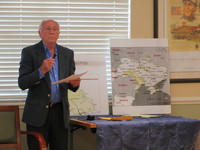
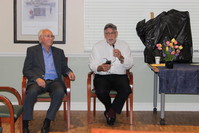
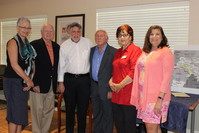
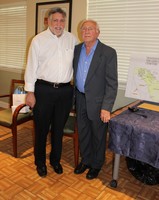
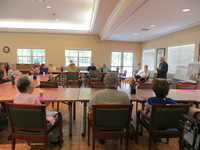
Local residents had an opportunity to hear from two community members whose lives were forever impacted by the Holocaust last week, when THE PLAYERS Community Senior Center hosted a special luncheon to mark Holocaust Remembrance Day.
Sponsored by the Council on Aging and Community Hospice of Northeast Florida, the May 4 luncheon featured guest speakers Beth El Rabbi Michael Matuson and Holocaust survivor Morris Bendit.
Rabbi Matuson spoke first about his struggle to understand the Holocaust and disclosed how it has shaped his entire life – from the time he was a child and spotted tattooed numbers on a neighbor’s arm and wondered what the numbers meant to the present day.
“The Holocaust is very much in my mind then as it is now,” said Matuson, adding that he still prays to try and understand. “It’s influenced my life in virtually every way.
“I don’t have any answers,” he continued. “I know how important it is to never forget. I know how important it is to never allow it to happen again, that I understand.”
Then it was Bendit’s turn to speak and share his story. Born in 1941 in Chernovitz, a city in western Ukraine, Bendit was just two months old when the Russian army enlisted his father to fight the Nazis. He never got the chance: While in transport, his father was killed when German bombers attacked his train. Shortly thereafter, in October1941, Bendit’s family and thousands of other Jews were forced out of their homes and herded into a ghetto, taking with them only what they could carry. They were marched to Transnistria, a territory in southwestern Ukraine that today is often referred to as “the giant forgotten cemetery.”
During the day, they were forced to march from village to village, town to town, Bendit said, and when his mother was too exhausted to carry him, his grandmother took over. In the bitter cold, they would look for shelter in any form they could find in an attempt to protect themselves from the elements.
“Many died naked and barefoot in the cold – if you asked me how I survived, pure miracle,” he said, listing just a few of the diseases he suffered from including typhus, malaria and scarlet fever. His mother, grandmother and aunt also survived, but they were the only survivors of his family by the time the concentration camp was liberated in 1944. Bendit was 4 years old.
After liberation, he immigrated to Romania and then Israel, where as an adult he served as a staff sergeant in the Israeli Navy. Shortly after finishing his military service, Bendit went to Montreal, Canada and stayed for three years. He immigrated to the United States in 1965 and has resided in Jacksonville for the past 31 years. He has three daughters and six grandchildren.
Bendit confided that no matter how many times he tells his story, it never gets any easier. He relives his painful past each time he tells his story. Hearing stories from actual survivors is a becoming a rarity, as an ever-growing number of people can only learn about the Holocaust in history books or from the remaining survivors.
“Twenty years ago – that’s when my mother passed away – I realized that the WWII generation is disappearing fast,” Bendit said. “Very soon there will not be any witness to the atrocity that took place in Europe from 1939 to 1945. There will only be stories that will pass down to future generations.”
So why share his story? It is a question he said he is often asked.
“I believe it should be told,” he said. “The reason is, history always repeats itself – no matter if it’s 70 years, 100 years or 1,000 years. Never again is not just a slogan. Never again means not to let your guards down, making sure that no other manmade human disaster ever happens again.
“We cannot fix the past, but we can improve the future,” he said. “Living in the past is not healthy; remembering the past is essential.”